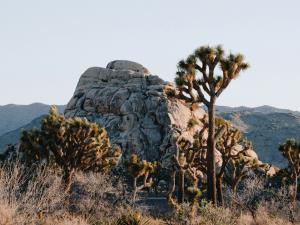News
We're Hiring an Administrative Manager!
Apply now to lead operations, event planning, and day-to-day administrative support for our team. First review date is July 11.
Welcome A'Maya Philpot, Visiting Scholar & Undergraduate Student at Tuskegee University
We are thrilled to welcome A'Maya to UC Berkeley this summer, where she hopes to gain hands-on experience in wildlife ecology research.
DSE Postdoc, Dr. Kristin Davis, publishes new research on the Eastern screech-owl in an understudied portion of its range
Kristin Davis, a postdoctoral researcher on our team, is lead author of a new paper that found Eastern screech-owls are responding to their environment in the Fort Collins, Colorado area in unexpected ways.
Berkeley Talks: Feeding the world without ‘eating the earth’
Professor Timothy Bowles, DSE's close collaborator on our sustainable ag work, and journalist Michael Grunwald debate the ways we can ramp up food production without causing more harm to the environment.
Grist: As temperatures rise, the US Corn Belt could see insurance claims soar
Great story on our team's latest agriculture research and open-source tool that shows challenges and opportunities for US corn farmers and insurance companies in the face of climate change.
Wisconsin Ag Connection: "Climate Change Threatens U.S. Corn Insurance Costs"
Our sustainable agriculture research and open source tool are featured on Wisconsin Ag Connection.
Farms.com: U.S. Corn Growers to Face Rising Insurance Risks
DSE's sustainable agriculture research and open source tool are featured on Farms.com.
Phys.org: New tool helps protect corn farmers and insurers from future climate extremes
Read more about our sustainable agriculture research and open source tool on Phys.org
The Hill: Climate change could deliver considerable blows to US corn growers, insurers: Study
Read a feature on our sustainable agriculture research & open source tool in the Hill.
DSE releases new agricultural policy research & AI tool
Today DSE and the University of Arkansas published a study in the Journal of Data Science, Statistics, and Visualisation and an open source tool that show the need for changes to federal crop insurance programs that could benefit farmers, companies, and the climate.
New Postdoc Position Open - Apply by 5/7
DSE is hiring a postdoctoral researcher to study extreme heat impacts on cattle and other animals.
DSE and Karuk Tribe Wildlife Team Presenting at World Bank Conference
DSE is heading to D.C. for the upcoming World Bank Conference: Measuring Development 2025: Biodiversity on Land and at Sea on April 29th.
DSE is Hiring a Data Analyst!
Join our team to support our work with the National Park Service. This full-time role is responsible for analyzing and preparing vegetation monitoring data. First review is 4/29!
Schmidt Sciences brings hands-on communications training to UC Berkeley scientists
Over 35 graduate students from departments across campus participated in the workshop at DSE
GeoJupyter community insight: improving the QGIS "bounce"
Check out the lastest post on the GeoJupyter blog about a new workflow we're building in JupyterLab to improve a common source of friction for users.
Mapping the return of Indigenous lands using data science
McKalee Steen, DSE team member and ESPM PhD candidate, is studying land return to US Indigenous communities, and the social and ecological impacts of those land acquisitions.
















